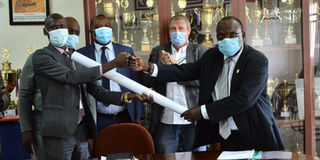Ndejje takes big step toward sports complex

Sports facility. Dr Akiya (left) receives the masterplan from Prof Lugujjo on Friday. PHOTO/GEORGE KATONGOLE
What you need to know:
The masterplan includes a football pitch, two multipurpose fields for rugby, throws and football, a modern gym, swimming pool, pavilion, beach volleyball, tennis court and an athletics track
Ndejje University has mooted plans to construct a sports complex worth Shs8b.
Ndejje, which will host this year’s inter-university games, looks at upgrading sports fields at their main campus in Luweero District as part of the project.
The masterplan includes a football pitch, two multipurpose fields for rugby, throws and football, a modern gym, swimming pool, pavilion, beach volleyball, tennis court and an athletics track.
The project could be completed in four years, according to the university estates officer, Eng Patrick Sekigongo.
The current facility hosts top flight football, with Uganda Premier League side URA and Ndejje University, which plays in the Fufa Big League.
Prof Eriabu Lugujjo, the vice chancellor, said Ndejje places importance to sports as a potential to unlock opportunities for talented young people.
“Having such a masterplan come to life is important for us,” Prof Lugujjo said on Friday while receiving a delegation from the Ministry of Health.
Paul Mark Kayongo, the university finance manager, said Ndejje’s sporting heritage has greatly impacted the sports landscape, producing top athletes while introducing new sports such as woodball in the country.
“We have already demonstrated our impact and partnering with the government is important in achieving our dream,” he said.
A fight to NCDs
The Ministry of Health, which has thrown its weight behind the project, looks at using the facility to promote lifestyle messages of fighting non-communicable diseases (NCDs).
The Commissioner for NCD Programme, Dr Charles Oyoo Akiya, said partnering with such facilities at Ndejje University is key.
“NCDs deprive us of people in the most productive age group. We can still do a lot to reverse the situation by modifying our lifestyles. The risk factor most common to all NCDs is physical inactivity which is so common with the working class,” Dr Akiya said.
The World Health Organisation recommends an average of 30 minutes of physical activity five days a week.
How it can work
Sustainability
Although most private facilities are for profit, Gunter Lange, a special presidential assistant, urged Ndejje to consider other viable options of generating income. He cited an industry around sports facilities such as shops, healthy food vending, sports equipment, medical support, or parking to look into.




